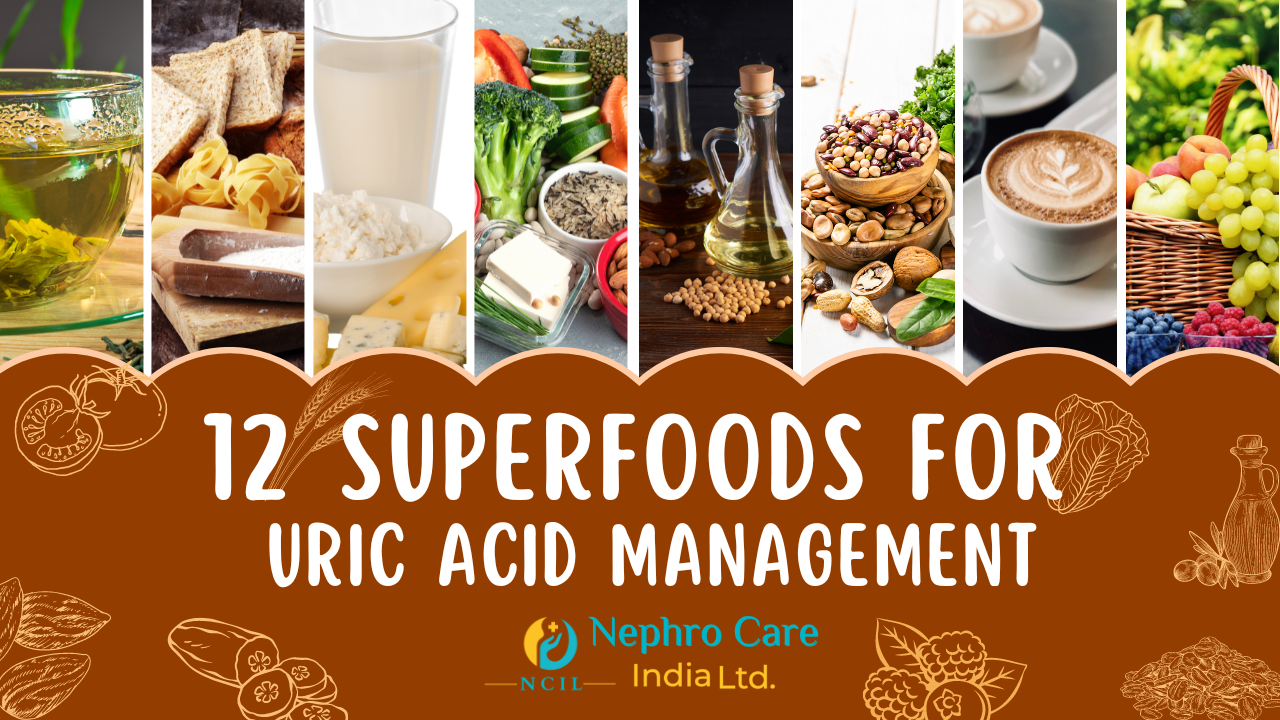
Dealing with high uric acid levels can be challenging, especially for those prone to gout, a condition marked by sudden, severe pain in the joints. One of the most effective ways to manage and prevent gout attacks is through dietary adjustments. By incorporating specific foods and nutrients known for their ability to uric acid management, individuals can significantly improve their condition and overall health.
This blog covers different nutritional guidelines, including fruits and vegetables, whole grains, and healthy oils, and provides tips on the consumption of these foods concerning uric and inflammatory acid control.


Although vegetables are generally beneficial for health, gout patients need to be selective. Opt for low-purine alternatives such as tomatoes, carrots, and broccoli, which also provide antioxidants. Patients with gout or high cholesterol can consider potatoes, cucumbers, and cabbage.
Low-fat milk and dairy products provide several benefits for gout patients. The proteins in low-fat milk may aid in excreting uric acid through urine, thereby reducing uric acid levels in the blood and minimizing the risk of gout flare-ups. For gout patients, lactose-free options are suitable and won’t exacerbate symptoms. Consider the following:


The best choice is to include whole grain products such as oats, brown rice, whole grain bread, and quinoa in your diet. These whole grains are high in fiber, which can help uric acid management.

It is wise to incorporate plant-based sources of protein into your diet. Here are some options:

You can incorporate olive oil or avocado oil into your cooking and salad dressings. These oils are abundant in monounsaturated fats and may possess anti-inflammatory properties.

Almonds, walnuts, flaxseeds, and chia seeds are excellent options. They offer healthy fats and protein without significantly affecting uric acid levels.

Green tea, commonly brewed as a beverage, contains antioxidants called catechins. These compounds can help inhibit uric acid production in the body and prevent the formation of uric acid crystals and large kidney stones.

While coffee consumption in moderate amounts may reduce the risk of gout due to compounds like chlorogenic acid and caffeine, it’s essential to consult your doctor before including coffee in your diet for uric acid management.
Hilsa, rohu and salmon are excellent choices due to their omega-3 fatty acids. These healthy fats not only help reduce uric acid levels but also have anti-inflammatory properties, which can alleviate swelling and inflammation associated with gout.

Apple cider vinegar is high in potassium and helps balance the body’s pH. Its acetic acid content may help lower the risk of obesity and diabetes, while its natural anti-inflammatory properties can alleviate inflammation and pain associated with gout.
Drinking around 2 liters of water daily helps keep urine consistent, which aids in dissolving uric acid.

Incorporating a thoughtfully selected diet can be highly effective in managing uric acid levels and mitigating the discomfort associated with gout. By choosing fruits rich in antioxidants, vegetables low in purines, and plant-based proteins, individuals can create a balanced approach to controlling uric acid. Additionally, including healthy oils, nuts, and high-fiber foods, along with staying hydrated and enjoying beneficial beverages like green tea, can further support uric acid management. Embracing these dietary strategies not only aids in reducing the risk of gout attacks but also contributes to overall well-being, allowing you to lead a healthier and more comfortable life.
2025-08-31 14:15:09
Reghu Nadh
Please send me diet WhatsApp group link
Thank you for your query! ? Please join our WhatsApp Diet group for the best guidance: https://chat.whatsapp.com/ErySjOcIWJn3kZYVpUPoK3